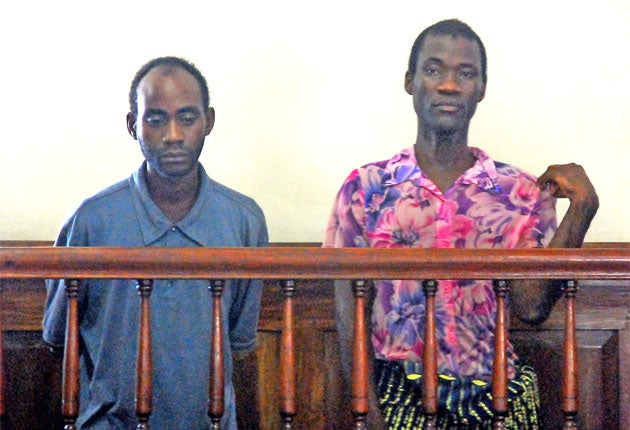Malawian men who tried to marry face 14 years in prison

Your support helps us to tell the story
From reproductive rights to climate change to Big Tech, The Independent is on the ground when the story is developing. Whether it's investigating the financials of Elon Musk's pro-Trump PAC or producing our latest documentary, 'The A Word', which shines a light on the American women fighting for reproductive rights, we know how important it is to parse out the facts from the messaging.
At such a critical moment in US history, we need reporters on the ground. Your donation allows us to keep sending journalists to speak to both sides of the story.
The Independent is trusted by Americans across the entire political spectrum. And unlike many other quality news outlets, we choose not to lock Americans out of our reporting and analysis with paywalls. We believe quality journalism should be available to everyone, paid for by those who can afford it.
Your support makes all the difference.A gay couple in Malawi are facing up to 14 years in prison after being convicted yesterday under colonial era sodomy laws in a trial that was widely seen as a test case for homosexual rights in southern Africa.
Steven Monjeza and Tiwonge Chimbalanga, who have been held without bail at a maximum security prison since they staged an open engagement ceremony in December, will be sentenced tomorrow.
Worldwide condemnation of the arrests and Malawi's laws criminalising homosexuality has had little impact inside the country itself where church leaders and politicians have backed the prosecution. In giving his verdict, Judge Nyakwawa Usiwa-Usiwa said the men were guilty of engaging in gay sex which was "against the order of nature".
The 26-year-old Mr Monjeza, and Mr Chimbalanga, 20, were arrested after they held a traditional engagement ceremony in Blantyre's Chirimba township, the first time a gay couple had attempted this in Malawi.
A party held to celebrate their engagement drew curious and angry onlookers and when news of the event reached the police the couple were arrested on 27 December. Local rights groups say the men were later beaten by police in custody.
Authorities have insisted that the two men were refused bail for their own safety. Since then they have been confronted with more jeering and accusations in court and have faced repeated death threats. Concerns for their safety were such that local activists had been planning to move them to a safe house in the event that they were freed.
Lawyers representing the pair argued that the laws criminalising homosexuality dated back to 1940 and were therefore unconstitutional. But the judge dismissed their case.
While yesterday's verdict was greeted with dismay by activists, the case has prompted some rights groups in the country to publicly tackle homophobia for the first time.
Undule Mwakasungula, a gay rights activist in Malawi, said that campaigners would keep pushing for a change in the law: "It's a challenge in terms of us pushing for legal reform. We can't be using a law that was enacted in 1940."
The couple, who have insisted that they intend to continue their relationship, thanked their supporters.
"We are grateful to the people who visit and support us, which really makes us feel to be members of a human family; otherwise we would feel condemned," said Mr Chimbalanga.
There are fears in the gay rights movement that the ruling may set an odious precedent. Some 38 out of 53 African countries have already criminalised consensual gay sex. And the plight of the Malawi couple comes at a time when "sodomy laws", bills criminalising same-sex intercourse, are being revived in some countries.
Uganda has drawn global attention after one of its lawmakers proposed new anti-gay laws that would in some cases call for life imprisonment or the death penalty.
In Nigeria, a bill awaiting legislative action would impose criminal penalties for engaging in or performing same-sex marriage ceremonies.
In Senegal, nine men, including a prominent HIV prevention worker, were sentenced to eight years in prison last year for "engaging in acts against the order of nature". After an international outcry their sentences were commuted to a fine.
Join our commenting forum
Join thought-provoking conversations, follow other Independent readers and see their replies
Comments